Delegates to the 54th Dene National Assembly came prepared to tackle the toughest issues dragging their communities down.
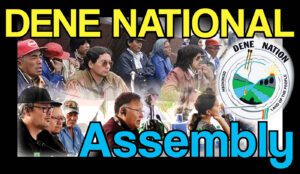 Many demanded less talk and more action to rid communities of drug dealers, get a better command of the organization’s finances and get the remaining land claims agreements over the finish line.
Many demanded less talk and more action to rid communities of drug dealers, get a better command of the organization’s finances and get the remaining land claims agreements over the finish line.
Parsing through the hours of discussion, debate and directions revealed a distrust of other levels of government – specifically the territorial government — a desire to assume more responsibilities in health care and education, and a plea to listen to Elders and better prepare youth for the future.
Here are some highlights from the more than 30 hours of talk around the large circle in the 400-person Chief Drygeese Conference Centre, overlooking the confluence of Great Slave Lake and Yellowknife Bay.
Illegal drugs and crime:
Drug trafficking and substance abuse was declared a state of emergency, as it drives crime and ends with deaths.

KFN Chief April Martel makes a point during the Dene National Assembly in Dettah. (James O’Connor/CKLB)
Kátł’odeeche First Nation Chief April Martel said the epidemic is claiming lives and causing extreme measures when addicts fall into debt with dealers.
“What’s happening, is our young people are … fronting drugs from drug dealers. What’s happening is they’re not paying them, so they’re cutting their fingers or toes cut off. That’s a reality. That’s (something) happening in our communities that we don’t see.”
National chief candidate Gerry Cheezie was clearly frustrated with attempts to address criminal activities in the communities
“How do we focus RCMP to help us deal with this crap? Our young people are dying now that fentanyl has come. Fentanyl is a drug that’s been overdosing all over Canada. I have been affected by crack in my family. We need to start implementing strategy, plans, action — how we’re going to do this. No more BS. It’s a serious problem. We all know that. What are we going to do about it now?”
Fiduciary responsibility:
The Dene Nation’s debt was highlighted by an auditor. Calls were made to reduce expenditures, secure more government funding, or develop its own revenue streams. The Dene Nation, said one delegate, shouldn’t be known as an organization that can’t pay its bills.
Host Chief Ernest Betsina said one way to help the books would be to switch almost $630,000 annual rent payments to a mortgage, by investing in its own headquarters.
“I mean, thanks for renting my hall (for the assembly), but for all the chiefs to have somewhere to go — especially the chiefs who come from out of town — they can go somewhere and have an office.
“We can have our building we call our own. Like the Legislative Assembly, the MLAs have their own building. Well, why don’t we have our own building too? So, if we’re spending that amount of money, why don’t why don’t we pay into a mortgage?”
The environment:
Speakers emphasized the need for active engagement with authorities and stakeholders to protect Indigenous waterways and biodiversity, not to mention mitigating and adapting to climate change.
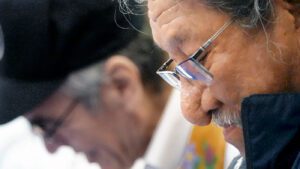
Gerry Cheezie prepares to speak at the Dene National Assembly. (James O’Connor/CKLB)
A resolution was created, stating Crown indifference and inaction in the face of threats to the Dene Nation’s water are a breach of treaties.
Whereas BC Hydro, existing dams on the Peace River, together with the Site C project, continue to impact and disrupt and disrupt life downstream of those projects, including the Peace and Slave rivers, Athabasca Delta and Great Slave Lake, then into the Mackenzie River, and ultimately the McKenzie Delta.
A formal hearing allowing elders and land users to provide testimony on the impact of low water levels on the region’s biodiversity and community way of life will be held (soon). The goal will be to collect data that can be used in legal actions, as needed.
Gerry Cheezie shared what he has learned in dealing with governments.
“What I’ve learned in my fight against the oil companies and the governments that approve these projects is that when we say the fish is not tasting right, the water is not tasting right, they say, ‘So prove it.’ I’ve been to environmental hearings, they say how you speak beautifully, but that doesn’t change anything. What changes everything is data you’ve got to prove to them before they all listen.”
April Martel took on the water regulators.
“Is anyone questioning the water board? What are they doing to protect our water? And. People that sit on that board, they’re not indigenous, what are they doing to fight for the rights for our people on that land? What are they doing to engage and consult us when it comes to the water and land?”
Intergovernmental relations:
The territorial government took it on the chin from many speakers, being blamed for many Dene problems.
Gerry Cheezie tore into the GNWT for being ineffective.
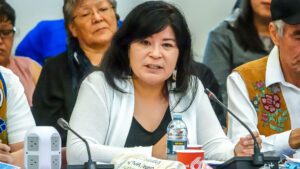
Candidate for chief Paulie Chinna speaks at the Dene National Assembly on Thursday. (James O’Connor/CKLB)
“To me, this is my government. People sitting around this table are my government, the GNWT across the city, over there, in their big, fancy building, that’s not my government. They’re not your government.
“It’s a colonial government. They have an annual budget of $2.2 billion — does any of that money go into your communities? Very little. Why are we, the owners of the land, the beggars in our own homeland?”
A former GNWT cabinet minister running for national chief provided an insight into the housing crisis.
Paulie Chinna, former Sahtu MLA and minister of housing, said housing conditions are unhealthy in many communities.
“While I was minister, I was able to go into the homes of people that have had severe living conditions, health conditions. It leaves the question of government … at some point this is going to lead to a lawsuit. How many people have been infected by cancer? How many people have been lost (because) of our living conditions?”
Land claim settlements for Akaitcho and Dehcho regions:
The Akaitcho process involves the Akaitcho Dene First Nations, including the Yellowknives Dene First Nation (Dettah and Ndilǫ), Łutsel K’e Dene First Nations and Deninu Kųę́ First Nation (Fort Resolution), and federal and territorial governments.
The latest update came one year ago, when then-premier Caroline Cochrane announced a draft agreement in principle had been reached.
The Dehcho process is also moving along slowly, with two years of wildfires wreaking havoc on meeting schedules.
Paulie Chinna rhetorically asked what the barriers are to getting negotiations over the finish line.
“Often, I’ve heard that the GNWT kind of sits in the way of the conversations happening with the Indigenous governments and the federal government.”
Gerry Cheezie noted the treaties were signed with the federal government only.
“I don’t believe that the GNWT should be at the table. We didn’t sign a treaty with the GNWT. We signed a treaty with the Crown. From all these all the things I heard from talking with chiefs is that the Government of Northwest Territories is one of the biggest obstacles to people getting a just and fair agreement that’s going to benefit them forever.”
The future of the Dene Nation:
The general consensus from speakers was that it is now time for less talk and more action.
National chief candidate Norman Yak’eula told the assembly that when he was MLA for Sahtu, his eyes were opened.
“I was going to change the world as an MLA. I saw the injustice going on in our communities that housing the education. We have to put the government in the Northwest Territories on notice: You’re no longer going to be around once we get our act together as a nation. There is power around this table.”
Cree Elder Henry Beaver cautioned the Dene Assembly to be prepared for opposition.
“As people in this room, the Dene Nation, get stronger and threaten the government, do they use any means to try to slow you down? To try to calm you down? We have to be strong if we want to defeat this government.”
In his acceptance speech, newly elected National Chief George Mackenzie — a former two-term Tłı̨chǫ grand chief — took a firm, but conciliatory tone, saying the Dene people “can work with anybody.”
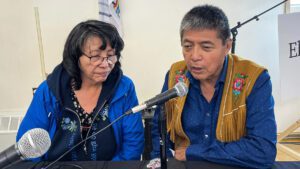
CKLB Indigenous languages announcer MaryRose Blackduck interviews newly elected Dene National Chief George Mackenzie in Tlicho Yati on Friday. (Photo courtesy of Celine Mackenzie Vukson)
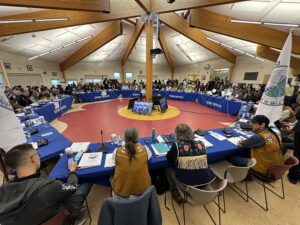
It was standing room only in the Chief Drygeese Conference Centre in Dettah for the three-day Dene National Assembly. (James O’Connor/CKLB)
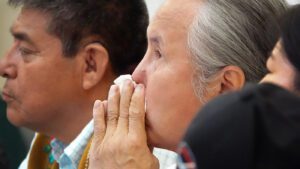
Dene National Chief Gerald Antoine became emotional during his pitch to be re-elected. (James O’Connor/CKLB)
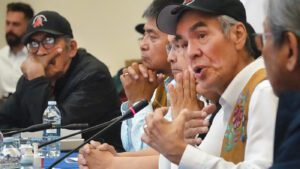
Norman Yak’eula speaks to the Assembly beside the five other candidates for chief at the 2024 Dene National Assembly in Dettah. The man looking on at the end of the table in the black jacket is Łutsel K’e Coun. John Catholique (James O’Connor/CKLB)
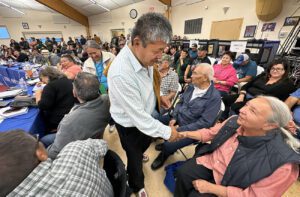
A weary, but happy George Mackenzie makes his way to the microphone after being declared the Dene Nation’s national chief on Thursday night after a day-long voting process. (James O’Connor/CKLB)
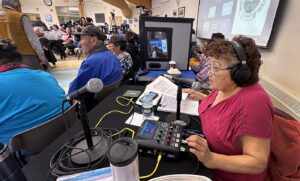
Judi Kochon, CKLB’s radio director and Indigenous languages announcer, on air last week speaking K’asho Got’ine at the Dene National Assembly. (James O’Connor/CKLB)
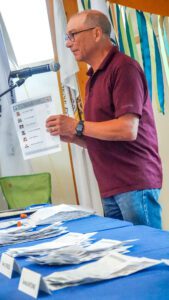
Dene National Assembly’s returning officer Kit Spence and piles of ballots being counted. (James O’Connor/CKLB)

Some lucky young folks enjoy a tasty lunch outside the Chief Drygeese Conference Centre at the Dene National Assembly in Dettah. (James O’Connor/CKLB)





